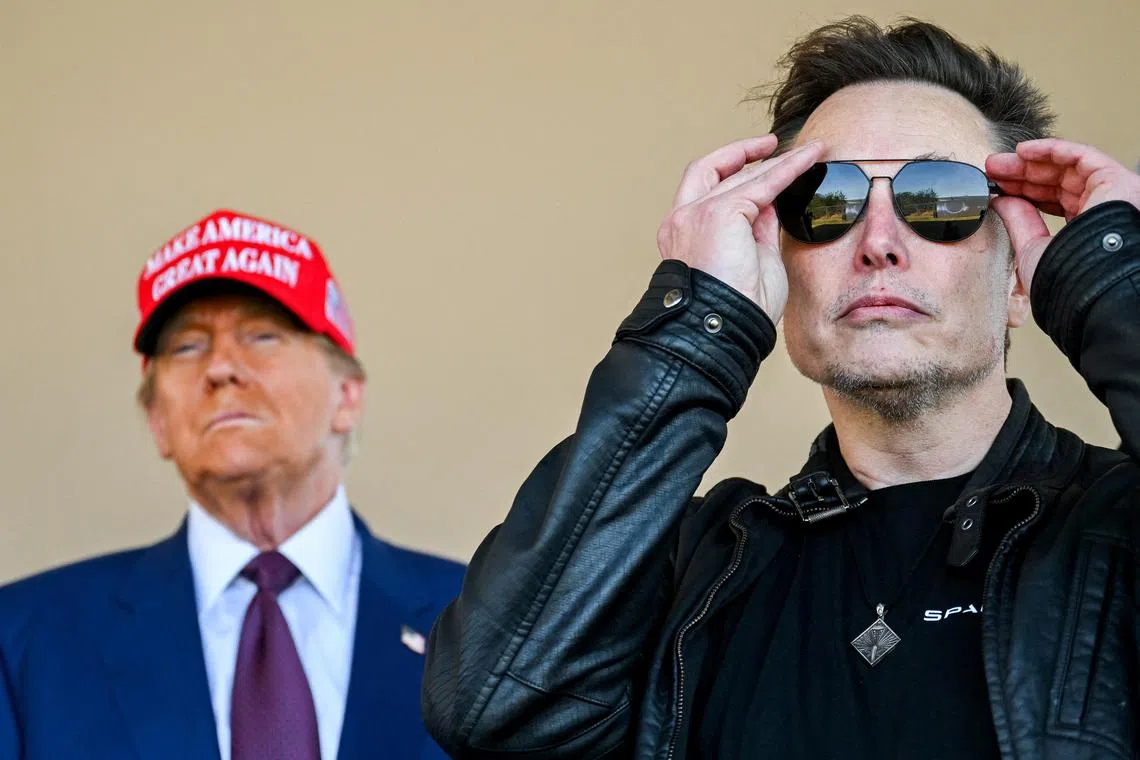Elon Musk’s wealth hits record $469 billion on post-election boom
Sign up now: Get ST's newsletters delivered to your inbox

United States President-elect Donald Trump and billionaire Elon Musk watching the launch of the sixth test flight of the SpaceX Starship rocket on Nov 19, 2024.
PHOTO: REUTERS
Follow topic:
New York - Mr Elon Musk’s net worth hit an all-time high of US$347.8 billion (S$469 billion) on Nov 22, driven by Tesla’s ongoing stock rally and a new funding round valuing his artificial intelligence start-up xAI at US$50 billion.
Mr Musk’s numerous businesses have been surging in value since Donald Trump’s election victory propelled Mr Musk, the so-called “first buddy”, into the political spotlight.
Tesla shares rose 3.8 per cent on Nov 22, reflecting ongoing optimism that the Trump team’s plans for self-driving cars and electric vehicle (EV) subsidies will give Mr Musk’s firm an advantage over its peers.
The stock is up 45 per cent since Nov 4, the day before the election, adding about US$350 billion in market value.
Meanwhile, the value of xAI has more than doubled since it last raised money in May, with The Wall Street Journal reporting that Trump’s victory helped drive new investor interest.
And Trump joined Mr Musk at a SpaceX launch on Nov 20; the company is discussing a private share sale which would raise its value to over US$250 billion.
Mr Musk, already the world’s richest person, is now wealthier than his previous high of US$340.4 billion set in November 2021, according to the Bloomberg Billionaires Index. His fortune – more than two-thirds of which is derived from Tesla stock and options – has increased 35 per cent since the day before the election.
Policy plans
Mr Musk, 53, aligned himself with Trump in the closing stages of the race, campaigning alongside him in battleground states and personally contributing more than US$170 million to a political action committee supporting the Republican candidate.
Members of Trump’s transition team have told advisers they plan to make a federal framework for self-driving vehicles one of the Transportation Department’s priorities, which would likely enable wider deployment of cars without human controls.
That would be a boon for Tesla, which has made rolling out such cars and trucks the centrepiece of its future strategy.
Current US federal policy allows Tesla and other automakers to deploy just 2,500 fully autonomous vehicles a year.
During Tesla’s most recent earnings call, Mr Musk complained about being stymied by patchwork state-level regulations, such as in California, that have limited its ability to scale up its self-driving technology.
Mr Musk will co-head a newly created Department of Government Efficiency, which he has said he will use to slash bureaucracy and regulations.
Trump also reportedly favours eliminating EV tax credits of up to US$7,500 and cutting emissions regulations that were rolled out by President Joe Biden’s administration.
That would hurt legacy automakers more than Tesla, whose sales are less dependent on federal support than many of its competitors, according to a Bloomberg Intelligence report. BLOOMBERG

